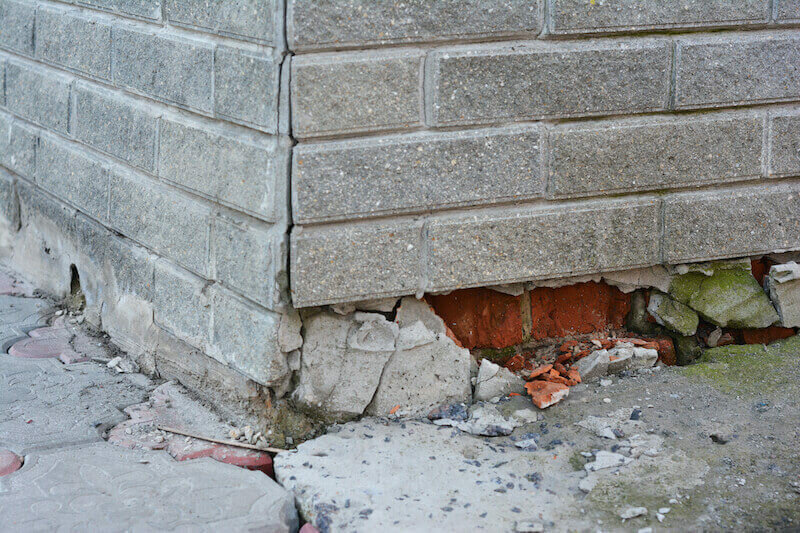If you suspect your home has foundation damage, it can be a scary feeling. Instantly you think about how it could affect the rest of your house, and then your thoughts lead to how expensive it will be to fix the foundation problem. Of course, you would happen to notice the issue because you were doing some minor home repairs to get your house ready to sell and discovered the possible problem. When faced with that type of situation, you probably would like to know what your next steps should be and how to go about selling a house with foundation damage. Below are some helpful tips on how to spot a foundation issue, the cost of fixing a foundation problem, and how to go about selling a house with foundation damage in New Jersey.
Sell A House With Foundation Damage In New Jersey

House Foundation Damage
Signs of foundation damage can be frightening, mainly because it may mean other things are going on with your home besides that. Water damage to your foundation could cause water to leak into your basement or crawl space and then eventually lead to mold growth. Foundation problems can also cause shifting in your house, resulting in cracked walls, door or window alignment to be off, sloping in the floor, and other noticeable signs. All these issues can begin to add up, and without addressing the root of the problem, the foundation, these problems will continue to occur. Foundation damage can significantly impact the value of your home, which will be noticed when you go to sell the house. Any indication of a foundation problem will usually be a big red flag to prospective buyers.
But before you get too concerned, you may have something else going on besides a foundation problem. It’s a common misunderstanding that foundation cracks and issues are, in fact, a foundation problem. Yes, there are some instances that concrete can deteriorate, but this is seen in homes built in the 1900s because the foundation material at the time contained either too much water or salty sand.
The cracks are usually caused by settling or merely the ground soil, which causes visible damage. This occurs because of variations in the weather and other elements that result in the soil expanding and retracting, leading to movement underneath your house. This movement is normal and to be expected. Though a little bit of expansion and foundation shifting is anticipated, it can still affect your residence. Now that you realize that cracks in concrete and block foundation are normal, the next step is to figure out which are harmless and which are serious.
How To Spot If Your House Has Foundation Issues
- The alignment of doors or windows is off.
- Doors are hard to open or close because they stick or get jammed.
- Windows are hard to close or have cracks in the glass.
- Noticeably sloping in the flooring or staircase.
- Signs of drywall cracks and gaps between the ceiling and wall.
- A large gap in the concrete around the outside of the home.
- Visible cracks in the ceramic tile or vinyl.
- Hardwood flooring planks have become ajar.
- Evidence of foundation water damage in the basement or crawl space in your house
After spotting a foundation issue, you will want to figure out the severity of the problem. This information will help you to determine what you’re dealing with.
- If it is small, less than ¼ inch, these can occur as the house settles and are otherwise typical cracks. You shouldn’t worry about these too much just yet.
- A hairline crack usually seen between the mortar in the concrete isn’t something to get too worked up about.
- If the crack is in an L shaped location, typically, these are shrinking cracks from a step in the foundation. Though this usually doesn’t mean structural damage, the cracks should be sealed over to prevent leaking.
- A stair-step or masonry crack is a more severe type. If the crack extends more than ¼ inch and the wall doesn’t have a natural shape or is bulging out, definitely have someone look at this.
- Horizontal cracks are the most serious. Usually, these indicate the foundation is broken by the soil and typically requires a new foundation for stability and to prevent further damage.
Cost Of Fixing A House Foundation Damage
Hopefully, you have a general idea of what type of foundation problem you’re dealing with, but just to be safe, getting an expert’s opinion would be advised to verify any suspicions. You will want to hire a structural engineer to access the foundation issue. They have a trained eye for this type of thing and would do a better job evaluating the problem.
When looking for a foundation repair company, make sure they have a structural engineer on staff and that the expert would be the one looking at your home. Once they look over everything and have a better idea of the damage, you can get an estimate for the repair costs.
To get an expert assessment will cost $1,200-2,100 in New Jersey.
Here are some examples of what some of these repairs cost may look like:
- A majority of New Jersey homeowners expect to spend between $3,500 to $6,000 on foundation repair costs, but if the foundation needs anchor bolts or new support piers, this can cost between $5,000-$10,000.
- If you’re repairing foundation water damage or leaks, that can cost anywhere from $2,000 to $7,000. You may also be advised to add waterproofing to secure the structure, which can cost $1,500 to $2,000 in New Jersey. They might recommend sealing the foundation too.
- If the damage requires extensive repairs or replacement, costs can quickly reach $20,000-$40,000 depending on the amount of work and size of your house.
If you are financially able and don’t mind putting in the work, prospective buyers may be less hesitant to offer to buy your property since they see all the heavy lifting, expensive repairs, and challenging renovations were completed. Because of this, fixing the foundation damage may be a good idea when you’re trying to sell your house but could cost you tens of thousands potentially.
Selling a House with Foundation Damage in New Jersey
When you see the cost of hiring a professional, fixing the foundation damage, and whatever else will need to be done, you probably want to figure out other options besides repairing the problem. Putting more money into a house you’re hoping to sell soon is hard to justify, especially in this instance because fixing the issue may not bring much value to the home. Doing updates to your house can add value, but when you’re repairing damage, people may not see the value in that. The good news is you do have options when it comes to selling your house. Check out these scenarios to see which best fits your needs and situation.
Scenario 1: Fix the Foundation Damage Before Listing
So you go through the whole process of hiring a structural engineer, figuring out the issue, paying to have it fixed, and dealing with construction for a few weeks- that’s great!
But don’t forget, you will need to do other general repairs around the house and fix any problems caused by the foundation damage. This could include replacing any cracked glass or tile, adjusting hardwood floor planks that are ajar, covering up drywall cracks or gaps, touching up paint in those areas, and that’s not all. If you have other repairs around the house, you will need to do those too.
Once that’s done, you will want to decide if you’re hiring a real estate agent to sell your house or selling the house by owner (FSBO). Whichever you choose, it will benefit you to declutter and clean your house. If your home is full of stuff, getting some type of temporary storage would be wise. A lot of sellers are advised to stage their place too.
Deciding between selling with a realtor or by-owner will be tricky because each has its pros and cons.
Selling with a Real Estate Agent
Pros :
- They handle the selling process.
- They help figure out the listing price.
- They handle marketing.
- They negotiate with buyers on your behalf.
Cons:
- Their commissions are expensive (5-6% fee upon the sale of your home).
- They make you sign a listing agreement locking you in for 3-6 months to sell your house.
- There is no guarantee that they will work hard to sell your home.
- There is no guarantee that they can sell your property quickly.
Selling By Owner
Pros:
- Potentially no commission charges ( if the buyer uses an agent, you may still pay 2.5-3% in commission fees).
- You would have complete control over the selling process.
- You can devote your attention to the sale of your home.
Cons:
- You handle everything
- You will need to figure out the listing price, which is the hardest thing for a by owner seller to get right.
- You will have to handle marketing your home.
- You will need to negotiate with buyers.
- You will need to show your house, take calls, and answer questions.
- You will need to confirm the buyer is qualified.
- You will need to do your research and make sure everything you’re doing is legal.
- You will need to do the paperwork.
There are other options besides these two popular home selling styles, which will be covered later.
After you determine your selling strategy, it’s time to wait and hope for your house with repaired foundation damage to sell. Currently, the median days for houses on the market in New Jersey is 61 days, and if you were to include escrow timeframes of 30-60 days. You’re looking at a couple of months until your house officially sells. Keep in mind those numbers are not based on only houses with previous foundation damage. Since your home has that negative history, it, unfortunately, may take even longer to sell. So you could be waiting a long time before recouping any money you put into the house to repair the damaged foundation and other renovations. For a lot of people, they want to sell their house fast and with limited costs to them, so this scenario may not be the ideal choice if you’re in the same position.
Scenario 2: Sell The House As-Is with the Foundation Damage
Seeing all the challenges and expenses, you will face in scenario #1, scenario #2 sounds ideal. But can you really sell a house as-is? It is possible to sell your house as-is. Some prospective buyers are looking for an investment property and see this as an opportunity to provide value. But on the other hand, some buyers see the words “foundation damage” and instantly think “money pit.”
Although an interested buyer might not be afraid of the renovations, keep in mind that their lender may not be okay with the idea. Lenders, including the VA and HUD, have strict guidelines that require the property to be structurally sound. So buyers could get denied financing from lenders or be stuck with paying higher interest rates, even unfavorable loan terms if they were to purchase this investment property. That alone may deter buyers away. So if you do choose to sell the house as-is, just understand that a majority of buyers might not be able to qualify for the loan to purchase your home.
What If I Don’t Mention the Foundation Problem?
Firstly, that isn’t something recommended to do. Not only is it dishonest, but it could cause legal consequences down the road. In the state of New Jersey, there are some common law rules regarding information you are obligated to disclose to a buyer. Under the common law, you have the duty to inform prospective buyers about known, latent (concealed) material defects in the home. Any false statements you say, write or omit that a buyer relies upon and causes a loss to the buyer or makes the property uninhabitable will set you up for a possible lawsuit, including a basis for fraud and misrepresentation. This lawsuit can even be brought before or after the closing, perhaps many years after, depending on New Jersey’s “statute of limitations” laws (the number of years in which a suit can be brought against you).
This even applies to selling a house with foundation damage as-is. The as-is condition clause doesn’t mean the buyer purchases the house in whatever condition it currently is in without any questions. The as-is clause instantly tells buyers some repairs are needed, which usually initiates the need for a home inspection to figure out what those repairs are. Even as-is buyers are entitled to an assessment and to cancel the contract. And if you were to intentionally misrepresent, fraudulently conceal, or even negligently conceal something, not in the failed inspection, you could face legal repercussions. Even with the as-is clause, it may not protect you in a common lawsuit or misrepresentation case. For example, hiding the information that there is an old underground oil tank on the property would be unwise.
Once you figure out if you’re going to pursue selling your house as-is, you will still need to figure out your selling strategy.
Scenario 3: Sell The Home to a Local New Jersey Homebuyer

The last scenario is to leave the foundation damage as-is and sell the residence to a home buyer like Halo Homebuyers, who are equipped to make the necessary repairs.
Because extensive repairs can be extremely expensive, it shouldn’t be expected for a homeowner to repair their foundation damage before selling. However, it shouldn’t be expected of the sellers either. Foundation problems in New Jersey require repairs with expert help and structural work, making it a project not to be taken lightly.
Unfortunately, there have been some instances where homeowners hired someone to repair the foundation damage and end up just making the issue worse instead.
When you sell to a home buyer like Halo, you can skip all the hassle and expense of repairing your foundation damage in New Jersey.
Besides frightening structural problems or foundation damage, Halo Homebuyers can handle other difficult property issues like termite damage, leaky roofs, fire damage, water damage, unfinished repairs, and many more. So if you would like to sell your home as-is without worrying about the renovations and expense – Halo Homebuyers is here to help you!
Halo Homebuyers have the cash on hand to buy your house, so no lending issues here. They can even close when it is convenient for you as fast or as slow as you would like. But if you’d like to know, their fast closing process takes 7-14 days!
Halo Homebuyers is a real estate solutions company and redevelopment company (Halo Redevelopment) that works with homeowners all across New Jersey. They do not charge real estate commissions or service fees and even pay your closing costs.
Halo has an easy 3 step home buying process and can give you a free estimate for your home within 24 hours. They provide win-win solutions for homeowners in the New Jersey area dealing with difficult situations such as pre-foreclosure, bankruptcy, title issues, unpermitted work, code violations, hoarder houses, and many more.
To get more information about their buying process and the Halo Homebuying company, please visit their website or contact them at (908) 547-0404 today!
